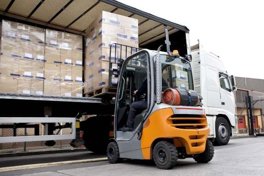According to the Health and Safety Executive (HSE) the main cause of fatal accidents for workers were falls from a height, and non-fatal injured amassed 561,000 for 2023. 31% of those were slips, trips and falls, which was the case for our client, who was a delivery driver.
Our client was working as a delivery driver and was attending a customer’s premises to deliver a pallet of food. To access the back of her van she used a Rhino safety access step which had been fitted to the back of the vehicle. The driver stepped onto one side of the step to retrieve a fallen box. As she did so, the step gave way causing our client to fall backwards.
As the step gave way, she injured her right leg, hip, and knee. Instantly she was in severe pain and was taken to the accident and emergency department at the local hospital. She had x-rays taken and although no broken bones were evident, she was given a splint to support her knee and crutches. She saw a physiotherapist, who believed there had been an internal derangement of the knee and in turn referred her to an orthopaedic surgeon. An MRI scan of her right knee and lumbar spine revealed a complex meniscal tear and she therefore had to have surgery.
A Complex Meniscal Tear causes:
- Pain with twisting
- Pain with turning
- Pain pivoting
- Back of the knee pain
It is not limited to this, as the injury can be very complex, as the complex meniscus is a pattern of various tears.
Our client continued to suffer from pain and disability in her knee but returned to work around 8 weeks later, but due to her injury she was unable to carry out her usual job. The pain in her knee got progressively worse and she was put on light duties which had a significant impact on her earnings. As time went on, she found herself stumbling and falling, including two significant incidents a few months apart. She was seen again by a consultant who noted significant degeneration and recommended a knee replacement operation.









